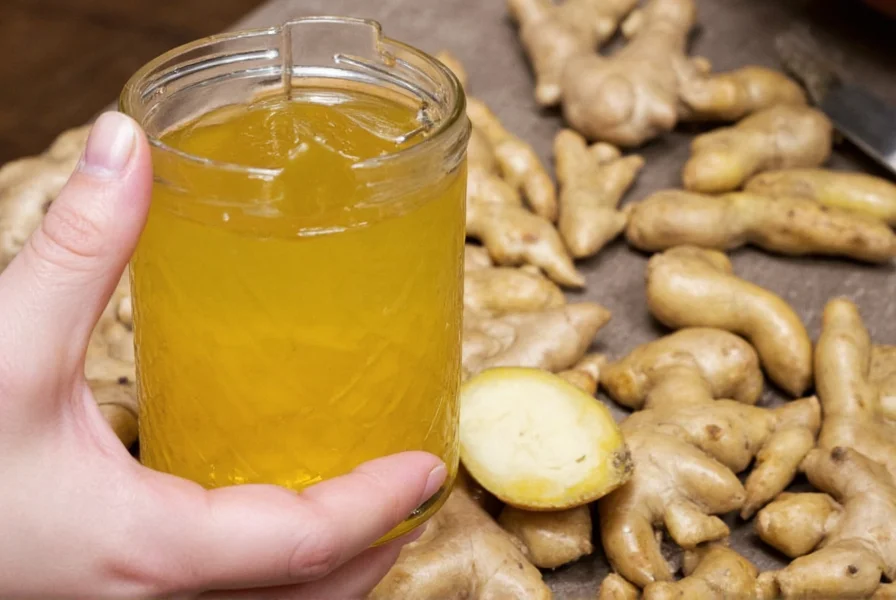Pickled ginger, known as gari in Japanese cuisine, is more than just a sushi accompaniment. This vibrant pink condiment provides unique health advantages that differ slightly from fresh ginger due to the pickling process. Understanding the specific benefits of pickled ginger requires examining both the inherent properties of ginger root and how vinegar-based preservation affects its bioactive compounds.
What Makes Pickled Ginger Different
Unlike fresh ginger, pickled ginger undergoes a preservation process typically involving vinegar, sugar, and salt. This transformation creates subtle but significant changes in its chemical composition:
| Property | Fresh Ginger | Pickled Ginger |
|---|---|---|
| pH Level | Near neutral (5.6-5.9) | Acidic (2.0-3.5) |
| Gingerol Content | Higher concentration | Slightly reduced but stabilized |
| Shogaol Content | Lower concentration | Increased through conversion |
| Additional Benefits | None | Probiotic potential from fermentation |
The acidic environment of pickling converts some gingerols to shogaols, compounds with potentially enhanced anti-inflammatory properties. This transformation, combined with the preservation of key bioactive compounds, creates a functional food with distinctive health advantages.
Science-Backed Health Benefits of Pickled Ginger
Digestive System Support
One of the most well-documented benefits of pickled ginger is its positive impact on digestion. The gingerols and shogaols in pickled ginger stimulate gastric motility and digestive enzyme production. A 2022 review in Nutrients confirmed that ginger compounds accelerate gastric emptying by approximately 25%, which explains why many cultures serve pickled ginger before or after meals. The mild acidity from vinegar further supports digestive health by creating an optimal environment for beneficial gut bacteria.

Nausea and Motion Sickness Relief
Clinical research consistently demonstrates ginger's effectiveness against nausea. A meta-analysis published in Integrative Medicine Insights found ginger reduced nausea symptoms by 38% compared to placebo. The pickled form offers practical advantages for nausea relief because:
- Its lower pH makes it gentler on sensitive stomachs
- Pre-portioned slices provide consistent dosing
- Refreshing flavor counters unpleasant tastes associated with nausea
This makes pickled ginger particularly valuable for morning sickness during pregnancy, post-operative nausea, and motion sickness during travel—benefits of pickled ginger for pregnancy nausea being one of the most frequently researched applications.
Anti-Inflammatory Properties
The shogaols formed during pickling exhibit potent anti-inflammatory effects. Research in Journal of Medicinal Food showed these compounds inhibit inflammatory pathways more effectively than fresh gingerols in certain contexts. Regular consumption of pickled ginger may help reduce markers of inflammation such as C-reactive protein, potentially benefiting those with:
- Osteoarthritis
- Muscle soreness after exercise
- Chronic inflammatory conditions
Antioxidant Protection
Pickled ginger maintains significant antioxidant capacity despite the preservation process. The combination of ginger's natural antioxidants with those formed during fermentation creates a synergistic effect. These compounds help neutralize free radicals and may reduce oxidative stress, which is linked to numerous chronic diseases. The specific antioxidant profile of pickled ginger makes it particularly effective against lipid peroxidation, a key factor in cardiovascular health.
How Pickled Ginger Compares to Other Forms
When evaluating health benefits of pickled ginger versus fresh ginger, several factors differentiate them:
- Digestibility: The pickling process partially breaks down ginger's fibrous structure, making it easier to digest for sensitive individuals
- Bioavailability: The acidic environment may enhance absorption of certain compounds
- Practicality: Pre-prepared nature encourages regular consumption
- Sugar content: Some commercial varieties contain added sugar, which should be considered for those monitoring sugar intake
For maximum health benefits of homemade pickled ginger, use a recipe with minimal sugar and high-quality vinegar to preserve the most beneficial compounds while avoiding unnecessary additives.

Practical Ways to Incorporate Pickled Ginger
To reap the digestive benefits of pickled ginger, consider these evidence-based consumption methods:
- Consume 1-2 slices 15 minutes before meals to stimulate digestive enzymes
- Pair with protein-rich meals to enhance digestion and nutrient absorption
- Use as a palate cleanser between courses to maintain digestive efficiency
- Include in post-workout meals to leverage anti-inflammatory properties
For those specifically interested in benefits of pickled ginger for bloating, consuming a small portion after meals may help reduce discomfort by promoting gastric motility.
Considerations and Potential Side Effects
While generally safe, certain individuals should moderate their intake of pickled ginger:
- People taking blood thinners should consult their physician due to ginger's mild anticoagulant properties
- Those with gastroesophageal reflux disease (GERD) may experience symptom exacerbation
- Individuals with low blood pressure should monitor their response
- Commercial varieties with high sodium content may not suit those on restricted sodium diets
The typical serving size for therapeutic benefits ranges from 1-4 grams of pickled ginger (about 1-3 slices), though individual tolerance varies. Understanding proper benefits of pickled ginger dosage ensures optimal results without adverse effects.
Conclusion
Pickled ginger represents a unique functional food that combines traditional culinary wisdom with scientifically supported health benefits. Its distinctive preparation method preserves and transforms ginger's bioactive compounds, creating a versatile condiment with particular advantages for digestive health, inflammation management, and nausea relief. When incorporated as part of a balanced diet, pickled ginger offers a practical way to access ginger's therapeutic properties in a palatable, convenient form. The key to maximizing benefits of pickled ginger lies in regular, moderate consumption as part of an overall healthy lifestyle.











 浙公网安备
33010002000092号
浙公网安备
33010002000092号 浙B2-20120091-4
浙B2-20120091-4